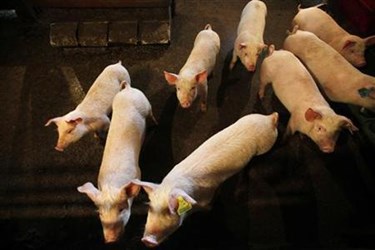Canada Leads The Herd On Pork Traceability
By Laurel Maloy, contributing writer, Food Online

Recent changes to Canada’s Health of Animals Regulation, effective July 1, will improve swine traceability
According to Jeff Clark, manager of PigTrace Canada, changes to Canada’s Health of Animals Regulation is a means to safeguard the pork industry. In actuality, the changes will benefit the entire livestock industry. It is hoped the lessons learned during this fledgling program will enhance traceability across the entire livestock supply chain.
The program came into being in response to the fast-moving virus, Porcine Epidemic Diarrhea Virus (PEDV). Not transmittable to humans, it spreads quickly through just one cubic centimeter (CC), equal to one fifth of one teaspoon, of infected fecal matter. An entire hog farm can become infected as one single worker moves from one barn to another. In March 2014, The Pig Site reported 27 farms across Canada have tested positive for this incurable virus. Survivable by sows, it can infect 100 percent of piglets, killing all. The Office of the Chief Veterinary Officer (CVO) in Canada is still investigating the outbreak.
PEDV causes severe dehydration in pigs, the direct result of acute diarrhea and vomiting. There has been no evidence that PEDV is a danger to humans, or even to other animals. Since there is no vaccine and no cure, proactive prophylactic measures must be taken in order to stem the tide of this detrimental disease.
PEDV has resulted in the death of millions of piglets, the deadly epidemic driving up pork prices and devastating hog farmers across the U.S. First detected in the U.S. hog population in April 2013, the uncontrollable virus has quickly spread to 30 states in just one year. The National Animal Health Laboratory Network (NAHLN) and the American Association of Swine Veterinarians (AASV) reports a total of 5,790 pig samples have tested positive since last April, with 491 of them occurring during April 2014. Testing became fully reportable last November; since that time 14,797 samples have been tested, with 33 percent testing positive for PEDV.
Learn how tracking products in real time can improve food safety
Canada’s most recent actions in the pork industry indicate traceability is of optimal importance. The regulatory changes will require pig “custodians” to report all movement within seven days of its occurrence, but stresses the importance of timely reporting. Custodians will be required to report departure and destination locations, and loading and unloading dates and times, along with the number of animals. They will also be required to report vehicle identification numbers, such as the license plate, as well as any animal identifiers required by law. Clark says pork producers have a number of reporting options at their disposal, including desktop and mobile applications, and a toll free number.
Here in the U.S., the National Pork Board and the American Meat Science Association (AMSA) recognize the shortcomings in the current pork traceability systems. We can be sure Canada’s changes, and the expected positive results, will be watched and recorded with great interest.
